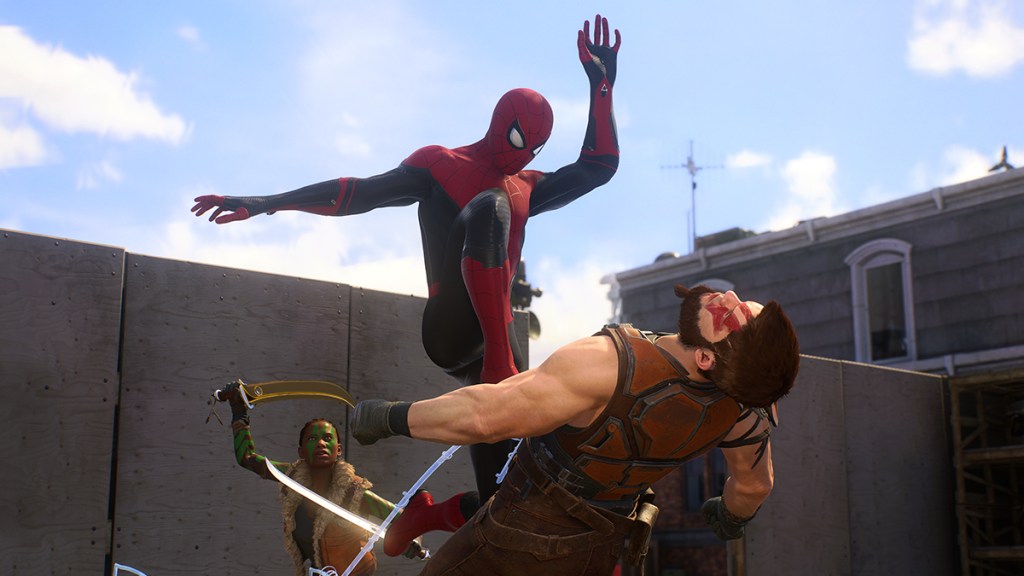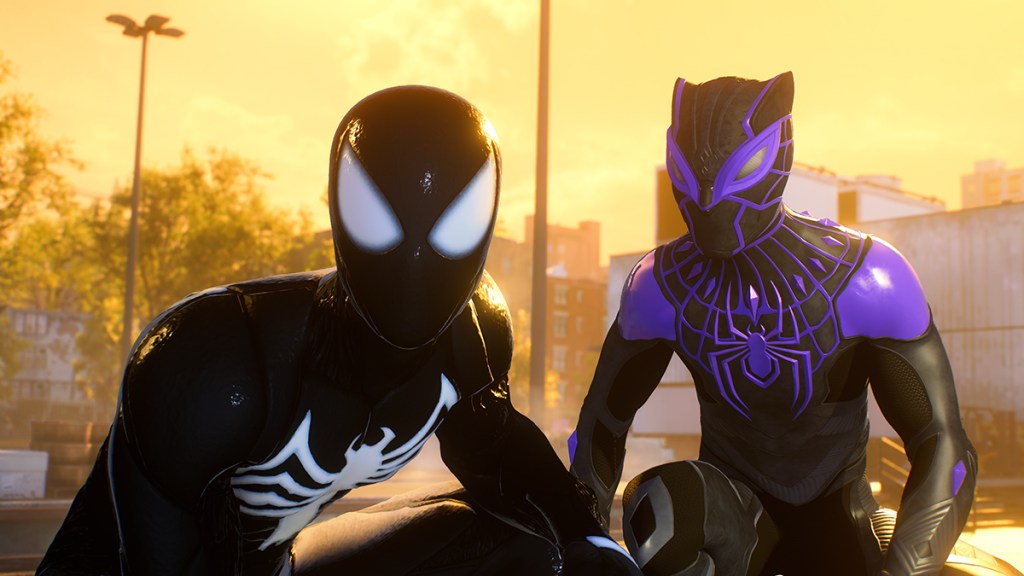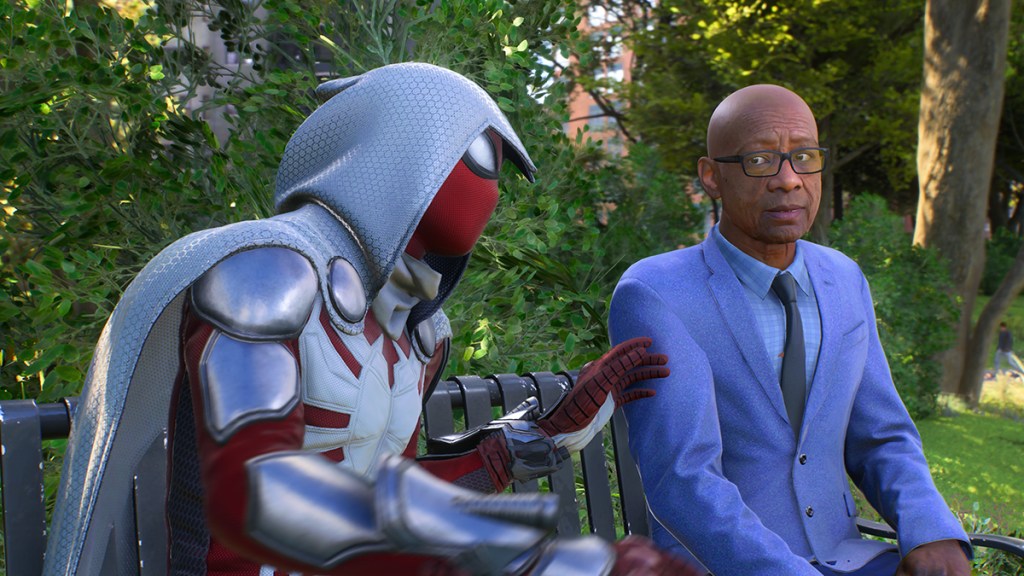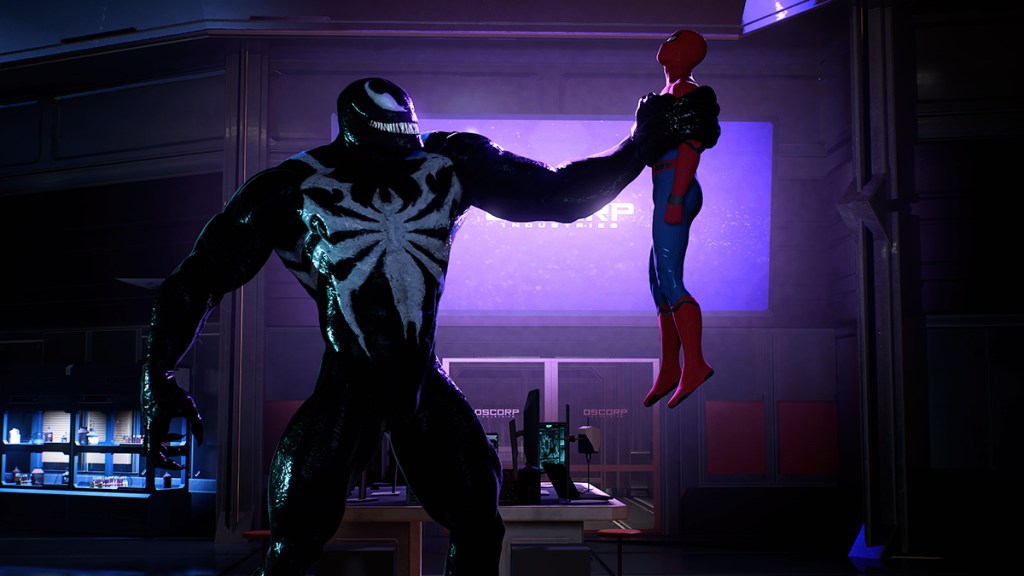Insomniac Games‘ Spider-Man has butted heads with The Rhino, gone toe-to-toe with fellow half-mechanical octopod Doc Ock, and survived a near-fatal trip against Scorpion, but none of those climactic showdowns have pitted the web-slinger against his greatest enemy: himself. Peter Parker’s insecurities have been made flesh with the symbiote, a goopy alien suit that gives him incredible powers at a heavy mental cost. When Spider-Man wins, Peter Parker loses.
It’s a layered mantra that is only part of what makes Marvel’s Spider-Man 2 a deeper and more nuanced experience when compared to the original. This superior sequel expands upon the foundation set by the prior two titles with added levels of complexity in nearly every area that take this pair of superheroes to new heights.

Some of these heights are literal, as both Miles Morales and Peter can soar through New York City with more grace and style while retaining the fluidity and accessibility that makes traversal riveting on a basic level. The Web Wings are a game-changing addition that enable players to dart through the skyline at a pace that nearly doubles what was previously possible. Catching slipstreams and narrowly avoiding skyscrapers gives gliding a unique thrill and sense of speed that has been unmatched in prior Spider-Man games.
But it’s not just the Web Wings that make getting around such a rush — it’s how they fit in with the other systems and handful of new abilities. Launching off an antenna, catching a wind tunnel with the Web Wings, wall running on the side of an office building, using the mechanical Spider Arms (or Venom powers) to propel forward, and redirecting downward momentum to slingshot into orbit in between regular swinging is an immensely exhilarating exercise that prioritizes speed and player choice.
Great movement mechanics get users to do more than just hold forward on the stick. And while that is technically still possible at the lowest levels, Spider-Man 2’s many abilities encourage players to use the bustling metropolis as an acrobatic playground and solve random crimes and pick up collectibles as they zip from mission to mission using every available ability. The stylish and exaggerated superhero poses are just the fitting visual flourish on one of the medium’s best traversal systems that all but nullifies the will to fast travel.

The Spider-Men’s supernatural athleticism is similarly displayed during combat, another aspect Insomniac has streamlined. Clobbering goons is still gratifying because of their agility, and figuring out how to strategically web up or take down the overwhelming amount of enemies is a frenetic exercise that ratchets up the stakes laid out by the narrative. That was true for the 2018 game, but even more so now given Spider-Man 2’s higher challenge and greater hordes of foes.
It earns that higher difficulty by providing a wider move set that gives players more utility. Parrying is the most notable of the bunch and, while it seems superfluous at first, it offers a more aggressive way to turn the tides and seamlessly keep a combo going. These upgraded combos can involve yanking an airborne enemy even higher up for a longer aerial juggle, disarming a sniper by whipping their own gun at them, quickly beating down someone pinned against a wall, or firing one of the many cooldown-dependent bioelectric or symbiote-powered special moves for an explosive finish. Like the traversal, the combat systems are responsive enough to be inherently rewarding but contain many extra layers to master.

The symbiote plays a prominent role in combat as well as the narrative, but it doesn’t start out that way. Spider-Man 2 spends a decent chunk of its intro delving into Peter’s and Mary Jane Watson’s personal life and work-related struggles while the inevitability of the symbiote’s destructive power looms in the background. This buildup pays off because of the symbiote’s natural ability to externalize internal struggles, most of which are shown in the earlier sections. Peter’s insecurities about his ability to be the perfect Spider-Man turn him into a literal monster, something the twisted hunter Kraven only further drives a wedge in with his barbaric rhetoric.
While Kraven’s bloodlust is a constant source of chaos and tension, the dual purpose of the symbiote makes it a more powerful antagonistic force since it pushes the characters emotionally and physically. Venom (or whomever the symbiote is attached to) is a menacing savage that can brutalize armies and level buildings, but it’s even more impressive how that alien is used to incite maturation in the cast. One boss fight in particular highlights this and is a wonderful example of marrying gameplay with the story to make a more powerful and dual-layered scene. Pressuring Peter as well as Spider-Man is what makes the symbiote such a compelling villain because it uses the fictionality of its comic book lore to augment the more human elements of its storytelling.
Miles also has his own problems that intersect with Peter’s, but his arc is not as heavily prioritized. His journey for closure crawls along at a relatively glacial tempo full of dead ends and small developments. It stands out when compared to how well-paced the Peter-focused parts are and how almost all of the other quests on the critical path contain revelations or important character building. Miles’ sections are another way for the game to poke at its themes of who deserves a second chance and the need for balance, all of which culminate in a beautifully constructed conclusion. However, the journey to that beauty isn’t as consistent as it deserves to be.

Miles is better served in the game’s side missions that emphasize the friendly neighborhood nature of Spider-Man. Smaller-scale conflicts bring out the more empathetic side of the hero and show the need for a more pastoral wall-crawler. Observing the horizon with a homeless man and reminiscing with a lost elderly man about his deceased wife aren’t as explosive as taking down a sinister selection of Marvel’s finest baddies, but they’re important to who Spider-Man is as a character. Even though they are outnumbered by more bombastic quests, these community-driven missions hold some of the most powerful moments in the game and clearly demonstrate this sequel’s stronger writing.
Marvel’s Spider-Man 2 Review: Final Verdict
These more intimate scenes coalesce wonderfully with its grander narrative to make Spider-Man 2 an amazing and well-rounded follow-up. Insomniac’s understanding of Spider-Man is unparalleled in the medium, as evidenced by the empowering and expanded combat mechanics, breathtaking traversal, and narrative that focuses on the heroes in addition to those underneath the mask. The team has mastered its craft and, like Spider-Man, is only getting better with experience.
-
Excellent traversal mechanics are faster and more varied
-
Combat is similarly deeper and has been streamlined
-
The well-written narrative presents a fantastic and well-rounded examination of Peter Parker and Spider-Man
-
Miles’ story, while still powerful in its own way, doesn’t progress as evenly as Peter’s
Disclaimer: This Marvel’s Spider-Man 2 review is based on a PS5 copy provided by the publisher. Played on version 1.001.001.





